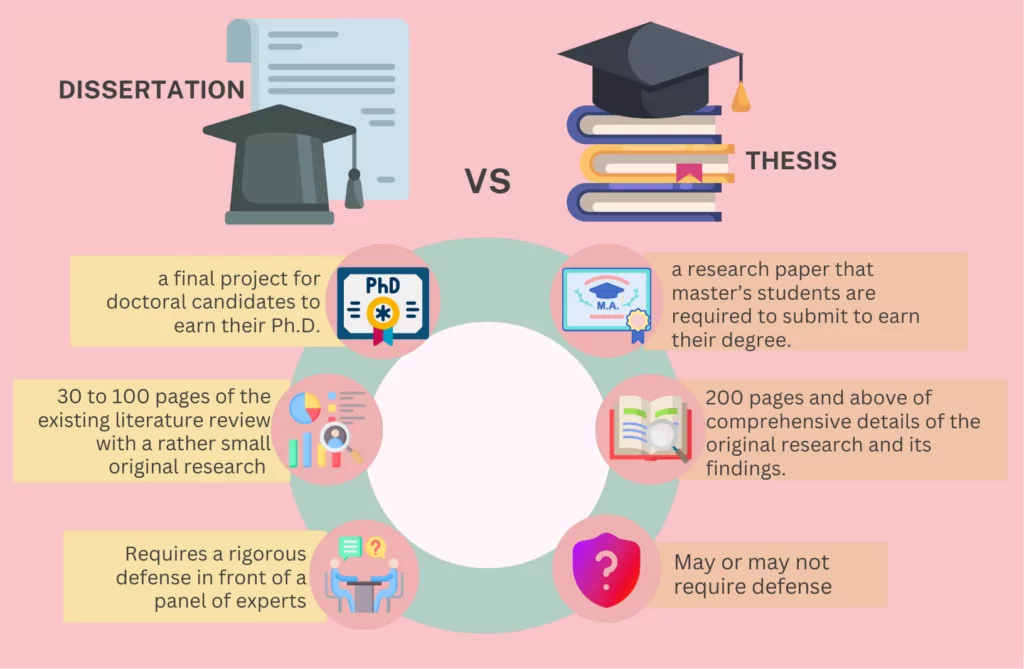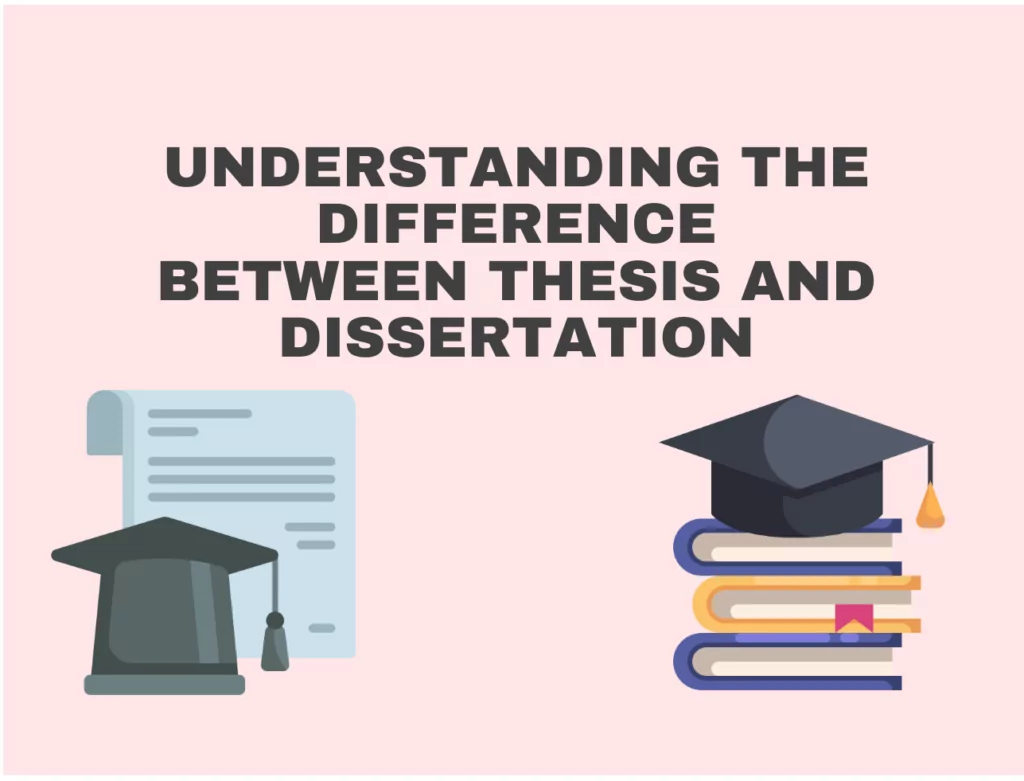The academic world is rife with traditions, terminologies, and nuances that can be overwhelming for those just entering it. Among the myriad of terms and concepts students encounter, two are prominent: “dissertation” and “thesis.” Trying to understand how to move through the complicated worlds of theses and dissertations, students often seek additional support and resources to streamline their academic journey. For some, this might involve turning to custom thesis writing services, which can offer tailored assistance and expert insights, helping them craft a document that adheres to stringent academic standards and authentically represents their research and findings. But in this article, we’ll first clarify the difference between these two definitions.

✅ AI Essay Writer ✅ AI Detector ✅ Plagchecker ✅ Paraphraser
✅ Summarizer ✅ Citation Generator
Key takeaways:
- A thesis is typically associated with a master’s degree, while a dissertation is a requirement for a doctoral degree (PhD).
- A dissertation demands extensive original research that contributes new knowledge to the field.
- Both academic works share structural similarities, such as literature reviews and methodologies. However, dissertations tend to be more comprehensive.
- The overarching goal of a thesis is to showcase a student’s grasp of existing knowledge in their field, while a dissertation aims to contribute new insights, theories, or perspectives to the academic community.
For first-year students, understanding the difference between a thesis and a dissertation might not seem immediately relevant. After all, there are lectures to attend, assignments to complete, and exams to prepare for. However, as the academic journey unfolds, the importance of these two terms becomes undeniable. Depending on one’s educational aspirations, either a thesis or a dissertation will be the final mission before obtaining a postgraduate degree.

Thus, the important thing here is not just about distinguishing between two academic papers. It’s about understanding the essence of one’s academic journey and the milestones ahead. Whether you’re a freshman just starting out or a seasoned scholar, understanding the nuances, similarities, and differences between a thesis and a dissertation is crucial. It prepares you for the challenges ahead and ensures that when the time comes to choose your path, you do so with clarity and confidence.
This article will go deep into the world of theses and dissertations, exploring their definitions, similarities, and differences. By the end, you’ll be well-equipped with the knowledge to navigate your academic journey with purpose and precision.
Understanding Thesis and Dissertation
The words “thesis” and “dissertation” are rooted in classical languages, which speaks to the age-old nature of these academic traditions. The term “thesis” originates from the Greek word “θέσις” (thésis), which means “a proposition” or “something set down.” In academic terms, a thesis is a statement or theory put forward as a premise to be maintained or proved. It’s the culmination of a master’s program, representing the results of independent research on a topic of significance in the respective field.

On the other hand, “dissertation” is derived from the Latin word “dissertātiō,” which translates to “discussion” or “debate.” A dissertation is a lengthy, formal treatise, especially one written by a candidate for a doctoral degree. It’s an original contribution to the existing body of knowledge in a particular academic field.
What is a Thesis?
A thesis is a research paper that master’s students are required to submit to earn their degree. It showcases the skills and knowledge they’ve acquired throughout their program. While it may involve original research, it can also demonstrate an understanding of the field, presenting a new perspective or interpretation of existing research.
The primary aim is to show the student’s ability to think critically about a topic and effectively communicate their findings.
What is a Dissertation?
A dissertation, conversely, is a more exhaustive work. Doctoral candidates submit it as the final project before earning their Ph.D. Unlike a master’s thesis, a dissertation must contribute new knowledge or practices to its field. It’s an extensive piece of original research requiring significant time, effort, and academic rigor. In this intensive process, some candidates seek assistance from top-rated dissertation writing services to ensure their work is polished, academically rigorous, and free of any errors.
The process involves proposing a unique research question, conducting the research, and then writing and defending the dissertation to a panel of experts.
At first glance, the two might seem quite distinct, but before exploring their fundamental differences, let’s take a quick look at what these two papers have in common:
| Purpose | Both serve as a testament to the student’s mastery of their chosen field of study. They demonstrate the individual’s critical thinking, research, and effective communication capacity. |
| Research Component | Both require a significant amount of research. Whether reviewing existing literature or conducting original research, students must prove their analytical and research skills. |
| Committee Review | Both theses and dissertations are reviewed by a committee. This committee assesses the quality, relevance, and significance of the student’s work. |
| Defense | Often, both require an oral defense. Students must defend their findings and methodologies in front of a panel of experts, showcasing their depth of knowledge and research capabilities. |
| Structure | Both documents have a similar structure, including an introduction, literature review, methodology, findings, conclusions, and bibliography. |
Difference Between Thesis and Dissertation
Understanding the distinction between a thesis and a dissertation is necessary for any postgraduate student. While the two share similarities, as discussed in the previous paragraph, they also have distinct differences that set them apart. In this chapter, we’ll first delve into the basic differences and then explore the more intricate structural differences.

Basic Differences
A thesis is typically required for a master’s degree, while a dissertation is a staple for a doctoral degree (PhD). When it comes to the depth of research, a thesis often involves reviewing existing literature or applying known information to a new area or topic. It may involve some original research but not as extensively as a dissertation. A thesis is generally shorter, often ranging from 30 to 100 pages, depending on the subject and institution. In contrast, a dissertation is significantly longer, often exceeding 200 pages, as it provides comprehensive details of the research and its findings.
The primary purpose of a thesis is to demonstrate a student’s understanding of their field of study and often seeks to answer a research question based on existing literature.
On the other hand, a dissertation aims to add to the existing body of knowledge in a field and involves discovering something new or a fresh perspective on an existing topic.
Structural Differences
Let’s look at a comparative table further to explain the distinctions between a thesis and a dissertation. This table will provide a visual representation, highlighting the structural elements and features that differentiate the two academic works, offering students a clearer perspective on what to expect from each.
| 🎓 DISSERTATION | 📚 THESIS | |
| Original Research | Extensive and mandatory | Limited or based on existing research |
| Length | Often 200+ pages | Typically 30-100 pages |
| Literature Review Depth | Comprehensive, often multiple chapters | Concise, usually one chapter |
| Methodology Detail | In-depth detailing of research methods | Overview of research methods |
| Data Collection & Analysis | Primary data collection and extensive analysis | Often secondary data or limited primary data |
| Contribution to Field | Must contribute new knowledge or perspectives | Demonstrates understanding of existing knowledge |
| Defense | Rigorous defense in front of a panel of experts | May or may not require defense |
| Publication Potential | Often results in multiple publications | Might result in a publication, but less common |
Conclusion
In wrapping up this exploration of theses and dissertations, it’s evident that while there are some similarities and numerous differences between the two, the defining factor ultimately boils down to the degree a student is pursuing. Whether it’s the depth of research, the length of the document, or the nature of the contribution to the field, these distinctions are inherently tied to the academic requirements of a master’s versus a doctoral degree. As students chart their academic paths, understanding these nuances can guide their decisions and help them align their efforts with their desired academic and professional outcomes.
FAQ
Follow us on Reddit for more insights and updates.





Comments (0)
Welcome to A*Help comments!
We’re all about debate and discussion at A*Help.
We value the diverse opinions of users, so you may find points of view that you don’t agree with. And that’s cool. However, there are certain things we’re not OK with: attempts to manipulate our data in any way, for example, or the posting of discriminative, offensive, hateful, or disparaging material.